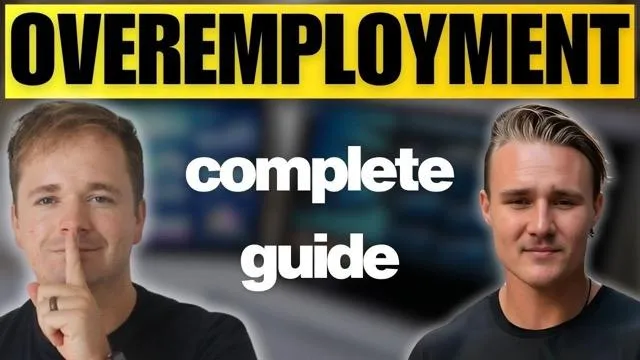
💰 How to Earn $250k+ With Multiple Remote Data Jobs (Overemployment)
I’ve done 1000+ coaching calls with aspiring analysts, but only one person has been brave enough to ask, “Do you think I could handle multiple full-time data jobs?”
I honestly didn’t know what to tell him. I had never been overemployed. I didn’t know anyone else who had been overemployed. So I couldn’t give him much advice. But now, this newsletter (and this podcast episode) is for him. And for you too. Can you actually have 2+ data analyst roles? Why would you even? Is it ethical? Let’s explore!
By the way, I forgot the dude’s name but he was an LDS Seminary Teacher living in Utah. If you’re reading this, you inspired this topic - please reply!
What is overemployment anyways?
Overemployment, or “job stacking,” is the practice of holding down two (or more!) full-time, remote roles at the same time, without either boss finding out.
Why would I want two jobs?
I already hate my one job. Why would I want two? Well here are 2 good reasons.
Increased Income: The easiest reason is you get paid two salaries. If you’re currently making $70,000, what if you could get paid $150,000 to do the same amount of work? Who wouldn’t want that?
Job Security: Having multiple jobs makes you layoff-safe. If you get laid off at one job, you aren’t out of a job. You still have your other jobs! In today’s economy, layoffs are going to happen, even if you’re an excellent employee. This can hedge your risk.
Now, there are other benefits like what if you don’t end up liking one company, you can learn faster, have more career growth opportunities, etc, but these don’t seem to be as realistically beneficial.
How would I pull off overemployment as a data professional?
I recently interviewed Delaney William, and he gives a full guide on how to do this. But here’s a high-level overview.
To pull it off, there are some requirements. One, you need to be remote. Needing to be in multiple places physically at once is still impossible (sadly). But you can virtually be two places fairly easily.
Two, you need free-time at your job. You need to figure out how to get what you’re asked to do in less than 40 hours. Ideally, less than 25 hours. You’d need to focus on this first before even considering getting a 2nd job. So how do you do that?
Social Capital: Position yourself as someone an efficient team member. Build trust and influence so you can do things like getting your team to cancel pointless meetings and make them emails instead.
Automation and AI: Use tools like ChatGPT to accelerate repetitive or low-level work, especially tasks like research, coding, or drafting reports. What used to take you 40 hours, may only take 4 now!
Outsourcing: For some of your non-sensitive, repeatable work (like data gathering or basic analysis), you might even delegate to a virtual assistant overseas for a lower wage.
I can’t land one data job. How would I ever land two?
In today’s market, it’s hard. But it isn’t about getting more certs, or getting better at SQL. It’s largely your job hunting assets (LinkedIn, resume, etc) and your job hunting strategy.
The number of offers you get is dependent on how many interviews you get.
The number of interviews you get is dependent on the number of applications you put out, plus how good your resume is, plus how lucky you get.
Once you have a really good resume, you can’t control your luck. The only thing left is the number of applications. And Delaney is a fan of mass applications. But using AI and automation to try to make it as easy as possible.
Is overemployment legal? Ethical? Should I do it?
Is it legal? Let’s put it this way, in the US, it’s not illegal, but this is not financial advice, do your own research. And please don’t sue me either way!
Is it ethical? I’ll answer with a question. Is it ethical when a company lays you off with no warning, just to prop up stock prices? Companies don’t always act ethically with their employees so is this just the reverse-uno? If you’re getting what they’re asking you to do, are you doing anything wrong? It seems like a blurred line to me.
Should you do it? I dunno. Probably depends on your circumstances. But I do know if you’re curious, Delaney has a lot of experience both doing it as a Product Manager, and teaching others, including data analysts and he’s built a course to teach you how to do it. In all transparency, I’m an affiliate of the course. And while I haven’t taken the course, I don’t know anyone else teaching this stuff. So if you’re interested, this is probably your stop.
Do I recommend overemployment?
For me, I don’t personally think I’d choose overemployment. It feels like a lot of work and I just don't want to lie or be secretive. But I won't judge you if you pursue it. I think the principle of taking your career into your own hands and making sure you’re providing for yourself well and becoming layoff-resistant is important.
Having a solid resume, a killer LinkedIn, and a resourceful network is a great start.


